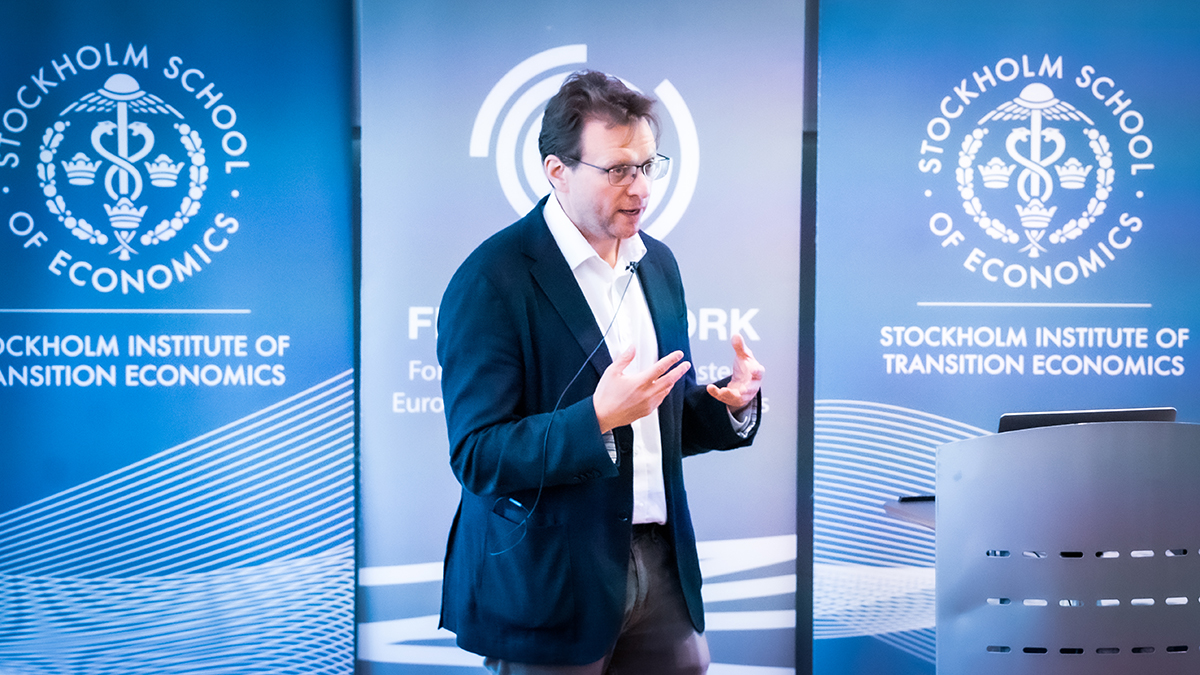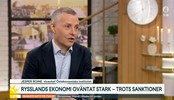Peter Pomerantsev discusses vulnerabilities in Kremlin propaganda at SITE seminar
November 11, 2024, Stockholm – At a seminar hosted by the Stockholm Institute of Transition Economics (SITE), renowned journalist and author Peter Pomerantsev provided an in-depth analysis of the Kremlin's propaganda system. Despite its extensive reach, the Kremlin's communication strategies reveal notable vulnerabilities that can be leveraged by Western policymakers to undermine Russian propaganda and support Ukraine effectively.
Economic polarization and public discontent in Russia
Pomerantsev highlighted the growing economic disparities within Russia. While regions like the Volga River's military-industrial hubs and the Far East experience economic growth due to increased trade, Western regions bordering Europe are struggling with the loss of trade. This polarization is compounded by inflation, which erodes any potential benefits from higher wages.

Photo of Peter Pomerantsev. Photo: Dominick Nilsson
Public dissatisfaction extends beyond economic divides. Rising household debt levels directly contradict the government’s anti-debt campaigns, while the deteriorating state of healthcare, shortages in some consumption markets, for example the automobile market, and military mobilization have sparked further discontent. The Kremlin's inability to address these issues, as well as sudden crises like the Prigozhin uprising or the Kursk invasion, has exposed cracks in its narrative control.
Strategic insights to counter Kremlin propaganda
Pomerantsev outlined actionable strategies for undermining Kremlin propaganda and fostering dissent. These include:
- Monitoring sentiment and employing indirect questioning
While support for the regime may appear inflated in surveys, tracking sentiment over time and using indirect questioning can reveal underlying discontent, especially on economic and social issues. - Framing identity and narratives
The Kremlin’s propaganda relies heavily on national identity, fueled by collective narcissism and resentment. To counter this, tailored messaging could focus on specific concerns of key groups within the Russian public. For instance, the already critical groups, such as Muscovites and younger generations, are particularly attuned to issues like corruption, and how the elites enriched themselves through the war. Loyalists, on the other hand, are sensitive to the economic strain from reduced social spending and lower-quality imports. Even the most active supporters of the regime express concern over the rising crime levels associated with the war. - ”Alternative media and messaging
Pomerantsev advocated for leveraging alternative identities, such as those of mothers, workers, or religious communities, in messaging campaigns. This approach mirrors successful Allied strategies in WWII, which appealed to non-nationalistic identities among Germans.

Photo of Peter Pomerantsev. Photo: Dominick Nilsson
Exploiting vulnerabilities to create doubt
The overarching goal, Pomerantsev argued, is to create moments of doubt within Russian society that mirror the regime’s loss of narrative control during the Soviet Union’s collapse in 1991. By amplifying discontent and offering compelling alternatives to Kremlin narratives, these efforts could challenge the regime's stability.
The seminar underscored the importance of understanding and exploiting the weaknesses within authoritarian propaganda systems. As the war in Ukraine continues, these insights offer valuable tools for policymakers and communication strategists supporting the Ukrainian cause.

Photo of Peter Pomerantsev. Photo: Dominick Nilsson




